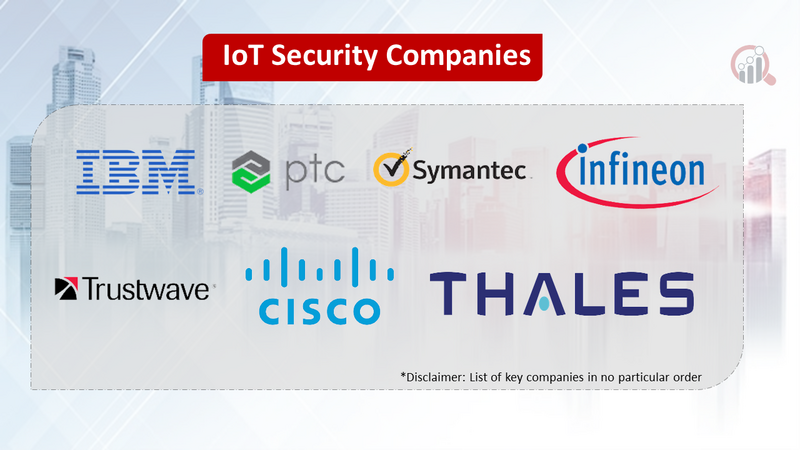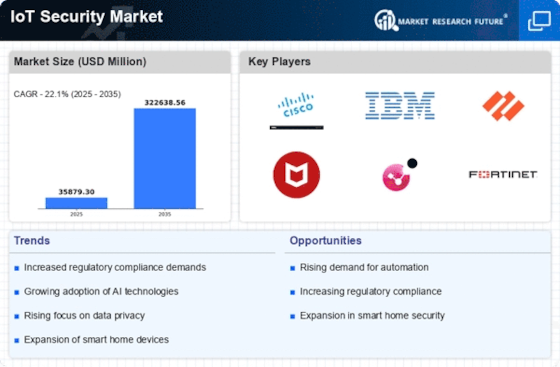Top Industry Leaders in the IoT Security Market

Competitive Landscape of the IoT Security Market
The Internet of Things (IoT) security market is experiencing explosive growth, driven by the rapid proliferation of connected devices and increasing awareness of cyber threats. This growth has attracted a multitude of players, ranging from established cybersecurity giants to nimble startups, vying for a share in this lucrative market. Understanding this dynamic landscape is crucial for both established players and newcomers seeking to navigate this competitive space.
Key Players:
- PTC
- Symantec Corporation
- Infineon Technologies AG
- Trustwave Holdings, Inc. (Singtel)
- Check Point Software Technologies Ltd.
- IBM Corporation
- CISCO SYSTEMS, INC.
- Thales
- AT&T Inc.
- Trend Micro Inc.
- DigiCert
- Intel Corporation
- General Electric
- Verizon
- Sophos Ltd.
Strategies Adopted:
- Partnership and Collaboration: Leading players are increasingly forming partnerships with device manufacturers, service providers, and other industry stakeholders to develop holistic and integrated security solutions. This collaborative approach helps to address the complex security challenges of the IoT ecosystem.
- Focus on Specialization: Companies are tailoring their solutions to cater to specific industry verticals, such as healthcare, automotive, and manufacturing, to address the unique security needs of each sector. This specialization allows companies to offer more relevant and effective solutions.
- Security-as-a-Service (SaaS) Model: The shift towards SaaS-based solutions is gaining traction, offering scalability, flexibility, and cost-efficiency to users. This model eliminates the need for upfront investment in hardware and software, making it particularly attractive for small and medium-sized businesses.
- Open-Source Security Frameworks: Open-source frameworks like Eclipse Kura and OpenWrt are becoming increasingly popular for securing resource-constrained devices. This collaboration fosters innovation and community-driven development, accelerating the adoption of secure IoT solutions.
Factors for Market Share Analysis:
- Breadth of Security Solutions: Offering a comprehensive portfolio of security solutions covering various aspects of the IoT ecosystem, including device security, network security, and application security, is crucial for capturing market share.
- Market Share in Adjacent Markets: Existing market share in cybersecurity or related domains provides an advantage in terms of brand recognition, customer base, and expertise.
- Technology Innovation: Continuous development of innovative solutions and integrating advanced technologies like artificial intelligence (AI) and machine learning (ML) for threat detection and response is key to staying ahead of the competition.
- Global Reach and Partner Ecosystem: Having a strong global presence and a robust network of partners, including device manufacturers, service providers, and other industry stakeholders, allows for wider market penetration.
New and Emerging Companies:
Several new and emerging companies are making waves in the IoT security market, bringing fresh perspectives and innovative solutions. These companies often focus on niche segments or offer unique features to differentiate themselves from established players. Some notable examples include:
- Armis Security: Offers a unified platform for agentless device security, providing visibility and control over unmanaged and previously unknown devices.
- Claroty: Specializes in securing industrial Internet of Things (IIoT) environments, addressing the specific vulnerabilities and threats faced by industrial control systems.
- IoTSec: Focuses on securing the Internet of Medical Things (IoMT) space, offering solutions that protect sensitive medical data and ensure the safety and reliability of medical devices.
Current Company Investment Trends:
Leading companies are making significant investments in research and development (R&D) to stay ahead of the evolving threat landscape. This includes exploring new technologies like AI and ML for threat detection and response, developing secure by design solutions, and investing in advanced security analytics capabilities. Additionally, companies are actively acquiring smaller startups with promising technologies and expertise to expand their solution portfolios and accelerate their growth in the market.
Latest Company Updates:
The CyLab Security and Privacy Institute at Carnegie Mellon University met with government representatives and business executives when the White House unveiled its new Internet of Things (IoT) cybersecurity label in 2023. Yuvraj Agarwal, an associate professor in the School of Computer Science, represented CMU at the occasion by presenting significant findings from CyLab's more than five years of IoT security and privacy label research.
The long-awaited Internet of Things (IoT) cybersecurity labelling programme, which aims to shield Americans from the plethora of security threats associated with internet-connected products, was finally introduced by the US administration in 2023. The programme, formally known as the "U.S. Cyber Trust Mark," intends to assist Americans in ensuring that the internet-connected products they purchase have robust cybersecurity defences against assaults.
With over $2 million in early seed funding acquired through a combination of product sales and private investment, OP[4], a new firm founded in 2023 on ground-breaking cybersecurity technology originally created for DARPA and productized by AFWERX, launched today.
Logitech International received a special invitation and honour to take part in the White House inauguration of the US National Label for Consumer IoT Security in 2023. The National Security Council sponsored the event, which was presided over by Jessica Rosenworcel, chairwoman of the FCC, and attended by representatives of both organisations as well as other top IT firms that are advancing consumer product security.










